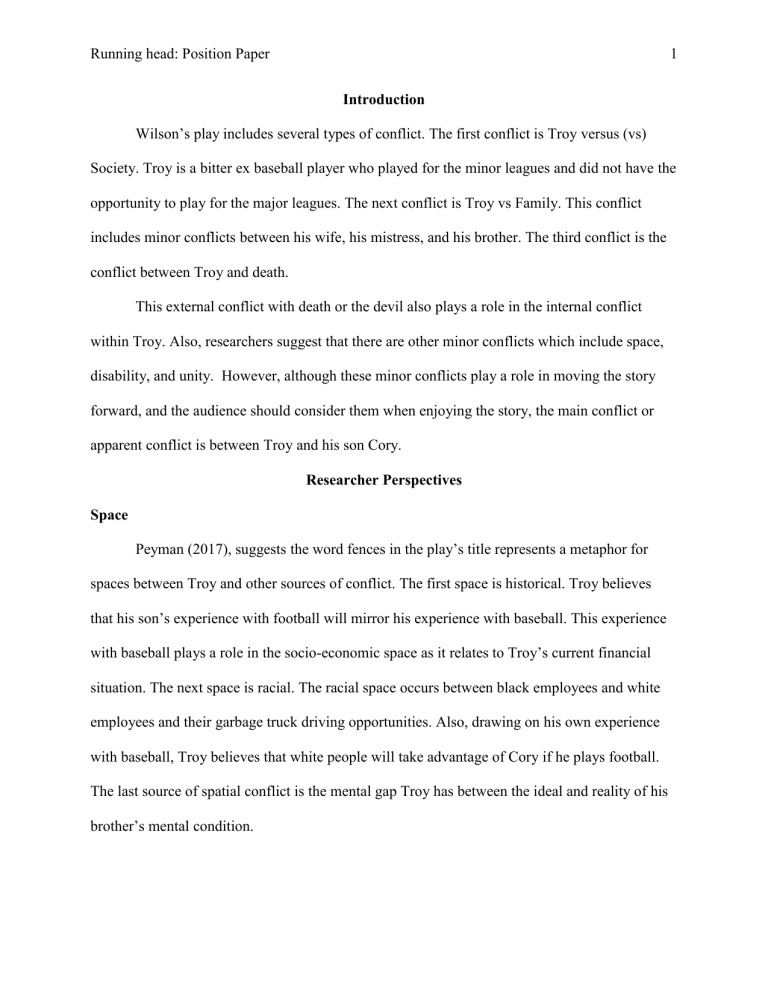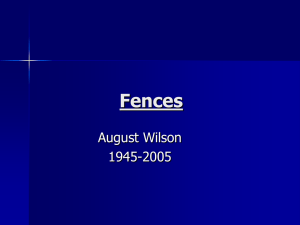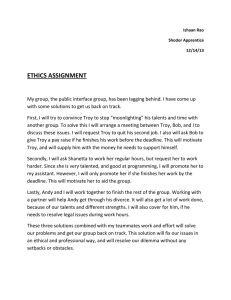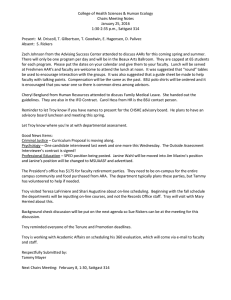
Running head: Position Paper 1 Introduction Wilson’s play includes several types of conflict. The first conflict is Troy versus (vs) Society. Troy is a bitter ex baseball player who played for the minor leagues and did not have the opportunity to play for the major leagues. The next conflict is Troy vs Family. This conflict includes minor conflicts between his wife, his mistress, and his brother. The third conflict is the conflict between Troy and death. This external conflict with death or the devil also plays a role in the internal conflict within Troy. Also, researchers suggest that there are other minor conflicts which include space, disability, and unity. However, although these minor conflicts play a role in moving the story forward, and the audience should consider them when enjoying the story, the main conflict or apparent conflict is between Troy and his son Cory. Researcher Perspectives Space Peyman (2017), suggests the word fences in the play’s title represents a metaphor for spaces between Troy and other sources of conflict. The first space is historical. Troy believes that his son’s experience with football will mirror his experience with baseball. This experience with baseball plays a role in the socio-economic space as it relates to Troy’s current financial situation. The next space is racial. The racial space occurs between black employees and white employees and their garbage truck driving opportunities. Also, drawing on his own experience with baseball, Troy believes that white people will take advantage of Cory if he plays football. The last source of spatial conflict is the mental gap Troy has between the ideal and reality of his brother’s mental condition. 2 Position Paper Disability McCormick (2017), writes one of the minor conflicts in the play is between Troy and his brother Gabriel’s disability. In the first conflict Gabriel states “You ain’t mad at me, is you?” (Wilson,1985, act 1, scene 2, line 38). Then Troy’s reply “Naw . . . I ain’t mad at you, Gabe. If I was mad at you I’d tell you about it” (Wilson,1985, act 1, scene 2, line 38), suggest that Gabriel may believe that there’s conflict between him and Troy over his disability income. In the next disability conflict Troy states (Don’t nobody wanna be locked up, Rose. What you wanna lock him up for?” (Wilson,1985, act 1, scene 2, line 58 and 59). This shows that there is conflict between Troy and the severity of Gabriel’s condition. Although the word disability in Gabriel’s case stands for an ailment or illness, one can argue that the word disability as it pertains to Troy’s marriage can stand for dysfunction or disorder. Unity Ngwa (2013), states that most people believe the word fence in the play represents the division between Troy and other sources of conflict including his marriage. However, Ngwa views the word fence as a metaphor for the unity Troy’s wife Rose tries to nurture within their relationship. After Troy tries to explain his infidelity Rose states “I been standing with you! I been right here with you, Troy. I got a life too. I gave eighteen years of my life to stand in the same spot with you.” (Wilson,1985, act 2, scene 2, line 110 and 111). This line not only shows how Rose tried to mend their relationship but also the sacrifices she made. Another example of unity on the part arose is after Troy’s death when she states “For my part in the matter. But at that time I wanted that. I wanted a house that I could sing in. And that’s what your daddy gave me.” (Wilson,1985, act 5, scene 2, line 78). This statement describes how Rose took 3 Position Paper responsibility for her actions in the relationship and made peace between Troy and herself after his death. Apparent Conflict The apparent conflict that Wilson uses to drive or move all other elements of the story forward is the conflict between the protagonist and antagonist. The protagonist in the story is Troy. In contrast, the antagonist in the story is Troy’s son Cory. Rose foreshadows the exposition when she states that “Cory done went and got recruited by a college football team”. Then “Troy replies I told that boy about that football stuff”. (Wilson,1985, act 1, scene 1, line 64 and 65). While Troy and Cory are working on the fence a flashback occurs. This flashback moves the story out of sequence and Troy discusses how he believes he was a great baseball player but then he comes back to reality and says but “I’m through with it now. You go on and cut them boards. (Pause.) Your mama tell me you done got recruited by a college football team? Is that right?” (Wilson,1985, act 1, scene 1, line 5). This line introduces the conflict of the story. Which is that Troy does not want his son to play football because he believes the football leagues will treat his son the same way the Negro leagues treated him when he played baseball. In comparison, the climax of the story occurs in act 2 scene 5 when Cory finally stands up to Troy and the situation becomes mildly violent. Finally, the resolution occurs when Cory and Ranelle sing the song that Troy’s daddy used to sing. Conclusion In summary, minor conflicts play a major role in moving the story forward. The first minor conflict is space and includes socioeconomic circumstances, race, and Troy’s delusions concerning Gabriel’s mental condition. The next minor conflict is disability which includes Troy taking Gabriel’s money to buy a house, and the family ignoring Gabriel’s fantasies. The third 4 Position Paper minor conflict is between Troy and Rose and how she worked to keep their relationship together. However, the main conflict or apparent conflict occurs between Troy and his son Cory, because Cory could get an opportunity that Troy did not have. 5 Position Paper References Kirszner, L. G., & Mandell, S. R. (2015). Portable Literature: Reading, Reacting, Writing. Nelson Education. McCormick, S. (2017). August Wilson and the Anti-spectacle of Blackness and Disability in Fences and Two Trains Running. CLA Journal, 61(1/2), 65. Ngwa, Y. I. (2013). Unfencing the Fence: The Wife as Mediator in August Wilson’s Fences. Labyrinth: An International Refereed Journal of Postmodern Studies, 4(2), 63. Peyman A.B. (2017). The Failure of the American Dream in August Wilson’s Fences. International Journal of English Language and Translation Studies, 05(04), 69– 75. Wilson, August. (1985). Fences. New York: Plume/New American Library.



